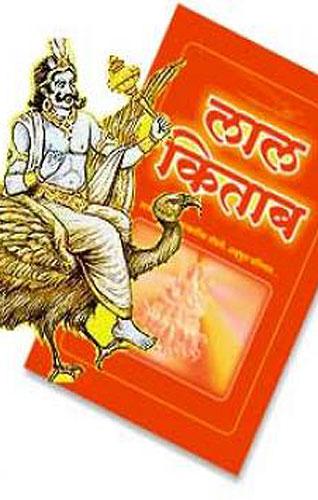
Above: a page from a Chinese calendar, listing good days and bad. Below, first from bottom: India`s favourite idol, Ganesh. Second from bottom: a list of auspicious days. Third from bottom - Hinduism`s Red Book - Laal Kitaab.



Faith
In Sikhi, Superstitions Will Get You Nowhere
by HARJINDER SINGH
In order to ward off the evil, destructive and inauspicious influences of Ketu, the "headless, shadowy half-planet," also known as the "descending lunar node," take the following steps immediately:
a. Feed jaggery to a monkey.
b. Offer a black and white blanket (i.e. of two colors) as alms to a temple.
c. Keep tied a white or silver-woven thread to both thumbs of the feet.
d. Practice celibacy.
e. Wear a kesar tilak - a saffron mark - on your forehead.
[Remedies prescribed in the Laal Kitaab - the Hindu "Red Book," which addresses all ailments and predicaments, based on Vedic astrology.]
For Sikhs living in any part of the globe, a visit to Amritsar is incomplete if they don't pay obeisance at the Darbar Sahib, popularly known as The Golden Temple.
In fact, they visit Amritsar with the foremost motive of experiencing spiritual bliss at Harmandar Sahib (as it is also often called) - bathing in the sarovar, listening to Gurbani kirtan, doing seva in the Guru Ram Das Langar Hall, and partaking of a communal meal in the langar.
This is the case despite the fact that Sikhi attaches no ritual importance to visiting and bathing at holy places of worship. Rather, it stresses the need to meditate on Naam.
Why should I bathe at sacred shrines of pilgrimage?
The Name of the Lord is the true pilgrimage.
My pilgrimage is in seeking spiritual wisdom within,
Through contemplation of the Word."
[GGS, I:687]
March 26, 2009 - a day I was blessed to pay obeisance at Darbar Sahib - happened to be masya (moonless night) for the month of Chet. I only realized this after reaching there. Seeing large numbers of devotees walking along the parikarma and long queues for entry into the sanctum sanctorum (the area inside the Harmandar where Guru Granth Sahib is "in court"), I enquired from one of the elderly devotees: "Is it some important day in the Sikh Calendar?"
He looked at me with astonishment and said, "Don't you know it is Cheti Masya?" I thanked him and moved on.
"Cheti Masya?" The words rang alarm bells in my mind.
Masya is the last day of the dark half of the lunar month, when the moon is hidden from view. The lunar month is subdivided into two fortnights called vadi and sudi by Hindus. In the former, the half moon wanes, while in the latter, it waxes. The full moon day and night is called puranmaashi.
In Hindu belief, these two days, i.e., masya and puranmaashi, are very auspicious. Hindus visit holy places, give offerings to idols in temples and take a dip in ponds and holy rivers, such as the Ganges, Yamuna and Godavari.
Gurbani teaches us that all these so-called "special" times - vadi and sudi, masya and puranmaashi - do not have any importance or significance whatsoever for Sikhs.
So I was wondering, "Are we Sikhs still blindly following age-old Hindu rituals, very contrary to Gurmat principles - the same rituals that our Gurus rejected outright as being no more than superstitions? Are some days really more important than others?"
Answers to these queries came to me while I was reciting from the Guru Granth a few days later:
"Fifteen lunar days, seven days of the week,
Months and seasons repeat themselves endlessly;
So do the days and nights.
That is how the world goes.
The comings and goings are by the Creator's Will;
The Creator alone is Truth immutable."
[GGS, III:842]
Guru Nanak preached and practiced against all rituals, and stressed leading a honest and truthful life, while meditating on Naam. All days are of equal importance for Sikhs. A day, any day, every day, is neither good or bad, if we humans know the true purpose of life.
"O, Nanak, that day is beautiful, when God comes to mind.
Cursed is that day, no matter how pleasant the season,
When the Supreme Lord God is forgotten."
[GGS, V:318]
Another thought that has long kept nagging me is about managing large numbers of devotees visiting the Darbar Sahib on so-called important occasions. With better and faster means of transportation, the number of pilgrims has increased manifold. Live relay of Gurbani kirtan on television from Harmandar Sahib has also contributed in a positive manner.
Before I dare to suggest any changes to help make paying obeisance at the Darbar Sahib more hassle-free, as well as more orderly and more efficiently managed, I would like to clarify that in no manner am I trying to find fault with the present state of management. In fact, it is managed far better at the Darbar Sahib than at the important shrines of other world religions ... but there is always some room for improvement.
Such suggestions, I hope, will be taken in the right spirit and not as an infringement on anyone's rights and privileges.
Two incidents that are testimony to the vehement resistance of our community to any change as well as the tendency to stall and scuttle proposed changes, involve the electrification of the Darbar Sahib in 1896-1897 and the installation of air conditioning in its sanctum sanctorum in 2008.
Lots of energy, time and money is wasted to oppose any change, just for the sake of opposing.
Some things that need immediate attention of Sikhs the world over are the upkeep of the edifice of the Darbar Sahib; making access to it more comfortable and less time-consuming, especially for the aged, handicapped persons, and mothers carrying babies; and ensuring the safe condition of the causeway between the darshani deorhi and the Harmandar.
[The darshani deorhi - literally, the "Viewing Pavilion" - is the structure serving as the entrance to the causeway, which leads to the Harmandar. There are a number of important rooms within this building: for example, the toshakhana or "treasury" which houses rare and valuable artifacts, is located on its first floor.)
On "important" occasions, the number of pilgrims soars dramatically: that is a sign of the chardi kalaa of the Khalsa Panth and its unflinching faith in the Shabad Guru.
Queues extend right up to the base of the Akal Takht. It can easily take 60 to 90 minutes in the queue before one can pay obeisance at Darbar Sahib. On Gurpurab days, even hours!
Would it be feasible to make some alternate route to cater to those with special needs, such as the aged, handicapped persons and mothers carrying babies? Can the number of devotees who stand in queues on the causeway be reduced, so that the weight to which it is exposed would be lessened?
The number of devotees who enter the actual building of the Harmandar, too, must be monitored and managed, so that it is never overly crowded. In fact, at times one is pushed around and jostled, while bowing one's head in reverence before the Guru.
I still remember the time when there were no railings or barricades in the Darbar Sahib complex. This part of the world was still on the other side of the "digital divide," but that boundary is decimated now. With the live relay of Gurbani kirtan from here, a few of the devotees, too, want their fifteen minutes of fame. People who want to be seen on the television screen during the live relay try to strategically position themselves behind the raagis (minstrels).
In the process, a few unsavoury incidents occur, which are duly captured by the TV cameras.
Would it be possible for the number of devotees who can sit in the space behind the raagis to be fixed, so that there is less jostling about for occupying a vantage point?
First and foremost, I feel as Gursikhs, we all must be well-disciplined, orderly and ready to help those in need, especially the aged, handicapped persons and women with small children.
All the above ideas and suggestions are just thoughts that frequently keep goading me. I am putting them across to the sangat as a humble Sikh; I am not sure if they are feasible at all.
References : Sabadarth Sri Guru Granth Sahib (Amritsar, 1964) and Encyclopaedia of Sikhism (Punjabi University, Patiala, 1992). Translations adapted from those by Sikhi to the Max and Dr. Sant Singh Khalsa.
May 15, 2009
Conversation about this article
1: Manjyot Kaur (New York City, U.S.A.), May 15, 2009, 2:11 PM.
What a lovely spirit of heartfelt humility and ardent devotion to Sikhi pervades this piece! It gives us a most welcome reminder that the answers we seek will always come to us through Guru Granth Sahib, if we are receptive to its Divine Wisdom. All Sikhs, regardless of their degree of personal observance, hope to have a truly blissful experience whenever they are blessed to visit Durbar Sahib. Suggestions like the ones this article proposes merit serious consideration, so that this might indeed become the case for everyone.
2: Amarpal Singh (Los Angeles, California, U.S.A.), May 15, 2009, 2:55 PM.
The greatest heartbreak everytime I visit India is seeing Sikhs behave like Hindus - that is, indeed, as S. Harjinder Singh points out so gently - in adopting the superstitions and rituals of the latter, especially after they have long been discarded by us through super-human effort for the last several centuries. And, the most idiotic thing of all is finding Ganesh idols even in some Sikh homes! This, I feel, is the depth of degradation!
3: Gurdit Singh (Birmingham, U.K.), May 15, 2009, 4:02 PM.
Thank you for this daring article. It is time we start confronting our modern-day mahants in Amritsar and other gurdwaras around the world and demand that they be respectful of Sikhi and Sikhs.
4: Mehar Singh (Fort Lauderdale, Florida, U.S.A.), May 15, 2009, 4:06 PM.
Thank you for the list of auspicious days. I'll be particularly careful on those days because I've always known that if you stay hungry on any given day, it invariably results in bad luck! So, on auspicious days, I never stay hungry ... and even have an extra dessert or two. Now that I think of it, I actually follow this rule everyday! That explains it: every day has been a lucky one for me so far!
5: Alamjit Singh (New York, U.S.A.), May 15, 2009, 4:10 PM.
Perhaps this was the reason why Bhindrawale was willing to sacrifice his life for Khalistan. He knew that if Sikhs remained a part of India, they would eventually become absorbed by the larger Hindu majority. This has happened throughout history. The minority is always absorbed into the majority. The only reason why Sikhs have delayed this process is because of our distinct identity. However, nowadays a majority of Sikhs are throwing away their identity. Also, another problem is that most people do not bother to read the Guru Granth Sahib. Rather, they defer this task to anyone who claims to be a granthi. This can be dangerous because anyone can claim to be a good Sikh, but then dictate their own twisted translation of gurbani. People should wake up and be more careful.
6: Balkar Singh (New York, U.S.A.), May 15, 2009, 4:28 PM.
And what about "sangraand"? Who introduced the practices around it in Sikhism? Clearly, they don't make Sikhi sense. Mercifully, the ritual is on the wane amongst people I know ... but I'm not totally condfident that it is on the way out in India. Maybe, someone can throw some light on these questions.
7: I.J. Singh (New York, U.S.A.), May 15, 2009, 5:27 PM.
Harjinder Singh is quite right. Our pristine teachings have been influenced (corrupted) by the sea of Hindu practices in which we exist merely as a small drop. But that was and is in India. Keep in mind that several million Sikhs now live outside India. Here in the U.S., we exist as a tiny drop in the sea of Judeo-Christian culture. It does and will continue to influence us here. Today we decry Hindu influence, will we rail against Judeo-Christian influence a hundred years (or sooner) from now? Harjinder Singh raises some interesting questions and we need to plan ahead.
8: Bishan Kaur (Ludhiana, Punjab), May 16, 2009, 9:39 AM.
Thank you, Harjinder ji, for raising these important issues. Hope someone in the SGPC reads your article and that it registers.
9: Minti Kaur (New York, U.S.A.), May 16, 2009, 1:45 PM.
A very thought-provoking article. Thank you, Harjinder Singh ji. Makes one aware of how deeply and negatively the influence of Hindu culture impacts on Sikhi today.
10: Kanwal Nain Singh (Lindsay, Ontario, Canada), May 16, 2009, 10:38 PM.
The points are well taken by the writer, and well commented upon by the readers. I am wondering how many members in the S.G.P.C. are real scholars in Sikhi. Those who are, must assume a responsibility to get rid of the dogmas and rituals from a Sikh's daly working life. The second important point raised by the writer was about relieving the congestion around Durbar Sahib. Crowd management has always been a very poor practice in India. One can see this every day on bus stops, at railway stations, in the daily traffic, etc. S.G.P.C. must give the task of improving the "traffic" to some experts and professionals who may study the current situation, and then give their recoomendations for a better control. The writer is absolutely right that there are many pilgrims who are simply too scared of being pushed around or jostled, especially the elderly and the handicapped.
11: Inni Kaur (Fairfield, CT, U.S.A.), May 17, 2009, 5:24 PM.
Superstitions have no place to one immersed in Naam.
12: Satnam (India), May 18, 2009, 12:35 AM.
It was a really interesting article.
13: Kiranjeet Kaur Dhillon (Sha Alam, Malaysia), May 18, 2009, 1:25 AM.
Thank you, Harjinder ji. Exactly my thoughts when I had the opportunity to visit the Durbar Sahib in December 2008. The queue just never stopped the three days I was there with my family. The real shock was the pushing and jostling around the langar hall. My first thoughts were: Is this what a Sikh does here to eat in the langar? Yes, we need to change our mentality as a nation and race and behave as true Sikhs as depicted by Guru Nanak, Guru Gobind Singh and the rest of the Gurus. Of course, as we assimilate with the majority race in the country we dwell in, we tend to be influenced by the various cultures and beliefs. In Malaysia, we tend to be superstitious like the Malay and the Chinese. At the end of the day, only our trust and belief in our own religion will lead us to the lives we sought to live.
14: Kawaldeep Singh (Mumbai, India), September 08, 2009, 1:29 AM.
Thank you very much for this article.
15: Sarbjit Singh (Ludhiana, Punjab), March 16, 2010, 1:36 AM.
Thanks, Harjinder Singh ji, for rewinding our memories and setting them on spiritual thoughts.
16: Harsimranjeet Kaur (Ambala, Haryana, India), July 31, 2015, 10:07 AM.
Thank you very much for this article as this is the time we Sikhs need to wake up as we are wasting lots of money on these so-called auspicious days which have no significance in Sikhism.


